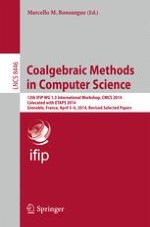2014 | Buch
Coalgebraic Methods in Computer Science
12th IFIP WG 1.3 International Workshop, CMCS 2014, Colocated with ETAPS 2014, Grenoble, France, April 5-6, 2014, Revised Selected Papers
herausgegeben von: Marcello M. Bonsangue
Verlag: Springer Berlin Heidelberg
Buchreihe : Lecture Notes in Computer Science
